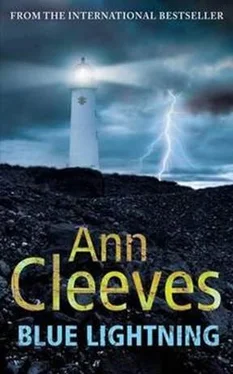Sandy yawned. Perez knew this was the sort of task he hated. The folks on the other end of the phone could never understand his accent and anyone with a higher education intimidated him. He’d grown up a bit in the last couple of years but he still had a low boredom threshold.
Perez felt the need to explain why he couldn’t track down Angela’s mother himself. ‘I’m going back to see Maurice. I’ll ask if he knows where the woman might be, but you’ve got access to records I won’t have.’
‘Is it so important to track down the mother? I mean, she could hardly have committed the murder, could she? Not if she wasn’t there. You said yourself it had to be someone staying at the field centre.’
‘Surely she has a right to know her daughter’s dead!’
But in terms of the investigation, Perez thought Sandy was probably right. This was a waste of time, a distraction activity. He didn’t want to admit to himself that he had no idea who had killed Angela Moore. But Maurice had lived with Angela for five years. He’d put up with her affairs, and continued to adore her. He must understand her better than anyone and with Poppy away from the North Light at Springfield with Fran and Mary, Perez at last had the chance to talk to him on his own.
Perez bumped into Maurice Parry in the field centre kitchen. The man showed no surprise at seeing him there. He looked grey and gaunt.
‘I was looking for Jane,’ Maurice said. ‘I don’t suppose you’ve seen her. Perhaps she’s in her room. Dinner’s all ready but I can’t find her. There’s nobody here to ask. They all must be out.’ He seemed put out that Jane wasn’t available for him. He looked around like a petulant child, demanding attention or reassurance. Perez found it hard to remember the competent, affable man who had run the centre.
‘Is there a problem?’
‘No,’ Maurice said. ‘Not really. I was hoping she might help me pack for Poppy. I’m sending Poppy out on the boat tomorrow and I thought I should get her stuff together. She went out with your fiancée and she hasn’t come back yet.’ Again there was a faint tone of complaint as if he blamed Perez for his daughter’s absence.
‘You’re not planning to go south yourself?’
‘No,’ Maurice said. ‘I’m not sure where I’d go. This is the only home I have now.’ He looked around the room. ‘I suppose there are friends who’d put me up, but I’d be terrible company.’
‘Can I help?’ Perez was a decent packer, better than Fran at least. And it would give him the chance to talk to Angela’s husband in an informal way.
But Maurice seemed unable to make a decision. ‘Perhaps I should leave it to Poppy. It doesn’t really matter if something gets left behind and she should be back soon to do it herself.’ He looked vaguely at Perez. ‘Perhaps you’d like some tea?’
‘Yes,’ Perez said. ‘Tea would be great.’ He expected Maurice to take him through to the flat, but the man turned round and switched on the kettle there. Perhaps he saw the big lighthouse kitchen as neutral territory. Perez thought Maurice might have questions about the investigation; instead this was the sort of polite conversation you’d have with an acquaintance, about the weather forecast and the prospect of a quiet spell at last. The tears and depression that had formed his first response to the murder had given way to a mindless focus on small details. Another way, Perez supposed, of coming to terms with Angela’s death.
‘I was wondering if you could help me fill in some gaps in Angela’s background.’ Perez interrupted Maurice’s description of the high-pressure system that was due to settle over German Bight.
There was a moment of shocked silence. Maurice dropped teabags into mugs.
‘I don’t know much about her life before she took up with me,’ he said at last. ‘She didn’t get on with her family.’
‘She must have told you something about them.’
‘Her father was a scientist. An academic. He had strange ideas about education and taught her at home instead of letting her go to the local school.’
‘Do you know why her parents separated?’
‘Angela never discussed it,’ Maurice said. ‘She resented her mother leaving, said she grew up feeling abandoned.’
‘How did she get on with her father?’ Perez asked. He cupped his hands round the mug of tea.
Maurice shrugged. ‘They were very close when she was young, but later Angela found him controlling. I had the impression he was a bit of a bully or at least that he tried to live his life through her. When she left home to go to university they lost contact.’
‘That was her decision? Not to see him again? It seems extreme, especially if they got on together when she was young.’
‘I didn’t mind,’ Maurice said. ‘It was Angela I cared about. I hadn’t married her family.’
‘What about her mother? Did Angela keep in touch with her?’
‘I don’t think so.’ Maurice opened a tin of Jane’s ginger biscuits and handed one to Perez. ‘She never talked about her and I didn’t ask.’
Walking back towards Springfield, Perez realized that the wind had dropped almost to nothing and suddenly it seemed very cold. Maurice had been right about the high pressure. The sky was clear and that night there would be a frost. What weird weather they were having this year! Storms followed by this sudden chill. The light was fading quickly. Soon it would be the shortest day, followed by the madness of Up Helly Aa, Lerwick’s fire festival. Another Shetland winter. He’d first met Fran in midwinter and liked to think of her in the snow, flushed with the effort of pulling Cassie on a sledge up the bank to the Ravenswick house.
On impulse he turned away from the road by the Feelie Dyke and walked west towards the Pund. If Angela took her lovers there perhaps it might hold other secrets, a diary perhaps, information about her parents, scraps of her life that she hadn’t wanted Maurice to see. Perez imagined how he’d feel if he’d given up on his mother and father, deciding he wanted to have no more to do with them. There were times when he’d thought that would make his life less complicated, but he knew he could never turn his back on them. Guilt was part of his make-up, part of what his first wife had called his emotional incontinence. There was a connection he had no way of breaking. He felt miserable if he left his mother’s phone calls unanswered even for a day.
The Pund was even more dilapidated than he remembered. Once it had been solid and weatherproof, lined with wood. There was still a loft bed reached by a ladder, but the place smelled damp. He pushed the door open. By now it was too dark to see much inside and he didn’t have a torch. In the last of the daylight coming through the open door he saw there was a candle stuck in a grubby saucer on a makeshift table made of a packing case. The place looked like a child’s den. Next to the saucer sat a box of matches. He lit the candle. In the first flare of the match being struck, he picked up details – there was a fire laid in the grate: white twisted pieces of driftwood and a few lumps of coal; a rack of wine stood in one corner, two glasses and a biscuit tin on a shelf. The candle caught and the light became more even. He stood in the centre of the room and looked around.
Again he had the impression that this was a Wendy house, a space for playing. The floor had been swept. There was a jam jar containing dried flowers on the windowsill. But he didn’t think the island children had been in here. This had been Angela’s room, the place where she escaped from field centre life, where perhaps she had lived out her fantasies with her young lovers. It threw a new perspective on the woman. Here, he saw, she had been domestic, even romantic.
Читать дальше












